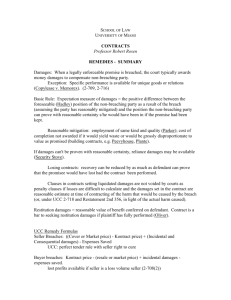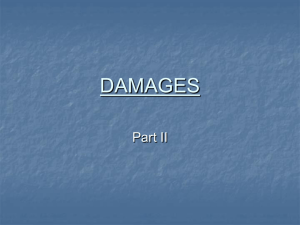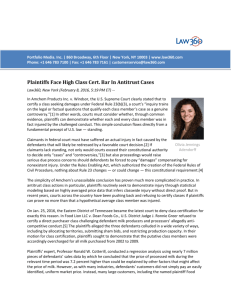Case brief
advertisement
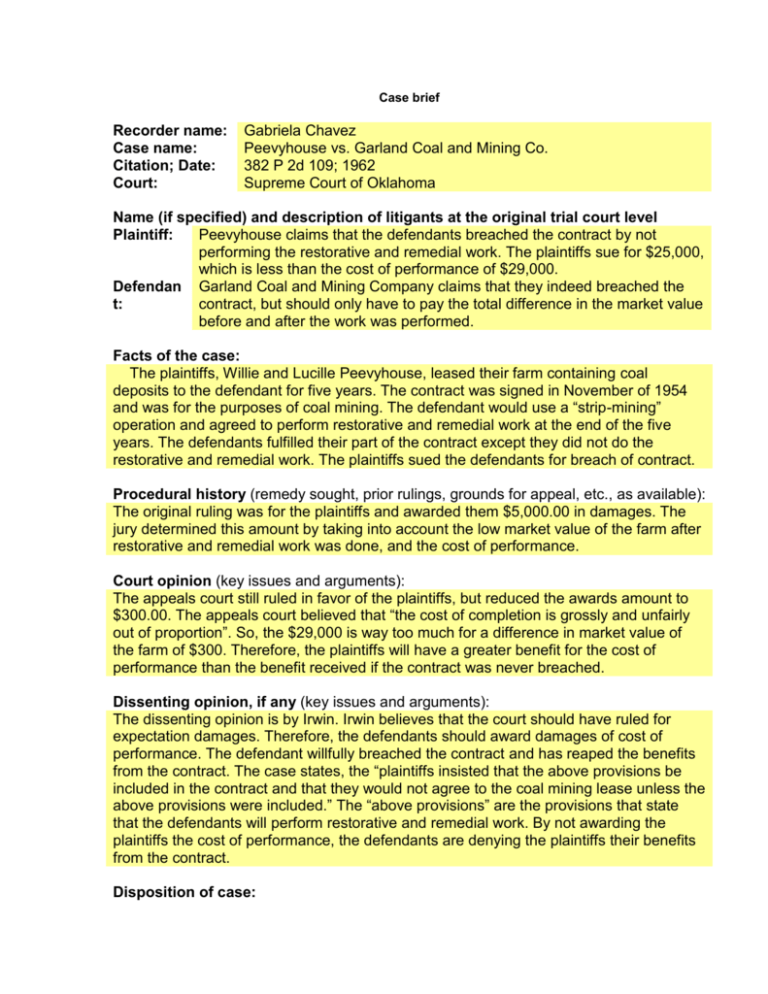
Case brief Recorder name: Case name: Citation; Date: Court: Gabriela Chavez Peevyhouse vs. Garland Coal and Mining Co. 382 P 2d 109; 1962 Supreme Court of Oklahoma Name (if specified) and description of litigants at the original trial court level Plaintiff: Peevyhouse claims that the defendants breached the contract by not performing the restorative and remedial work. The plaintiffs sue for $25,000, which is less than the cost of performance of $29,000. Defendan Garland Coal and Mining Company claims that they indeed breached the t: contract, but should only have to pay the total difference in the market value before and after the work was performed. Facts of the case: The plaintiffs, Willie and Lucille Peevyhouse, leased their farm containing coal deposits to the defendant for five years. The contract was signed in November of 1954 and was for the purposes of coal mining. The defendant would use a “strip-mining” operation and agreed to perform restorative and remedial work at the end of the five years. The defendants fulfilled their part of the contract except they did not do the restorative and remedial work. The plaintiffs sued the defendants for breach of contract. Procedural history (remedy sought, prior rulings, grounds for appeal, etc., as available): The original ruling was for the plaintiffs and awarded them $5,000.00 in damages. The jury determined this amount by taking into account the low market value of the farm after restorative and remedial work was done, and the cost of performance. Court opinion (key issues and arguments): The appeals court still ruled in favor of the plaintiffs, but reduced the awards amount to $300.00. The appeals court believed that “the cost of completion is grossly and unfairly out of proportion”. So, the $29,000 is way too much for a difference in market value of the farm of $300. Therefore, the plaintiffs will have a greater benefit for the cost of performance than the benefit received if the contract was never breached. Dissenting opinion, if any (key issues and arguments): The dissenting opinion is by Irwin. Irwin believes that the court should have ruled for expectation damages. Therefore, the defendants should award damages of cost of performance. The defendant willfully breached the contract and has reaped the benefits from the contract. The case states, the “plaintiffs insisted that the above provisions be included in the contract and that they would not agree to the coal mining lease unless the above provisions were included.” The “above provisions” are the provisions that state that the defendants will perform restorative and remedial work. By not awarding the plaintiffs the cost of performance, the defendants are denying the plaintiffs their benefits from the contract. Disposition of case: Ruling in favor of the plaintiffs with $300.00 in damages. ANALYSIS OF THE CASE 1. Course topic of the case: Liability for damages 2. How does the case relate to the course topic? This case, along with Groves vs. John Wunder Co., illustrates an efficient breach of contract. Since the breach of contract is known and all that there is to be determined is the amount in damages, it illustrates liability for damages. The cases assess how to award the damages in two different ways. This case ruled for reliance damages (or market value of $300) because of the large difference between market value and the cost of performance. 3. Which previously assigned cases, if any, are related to this case, and how does this one differ? This case is related to Groves vs. John Wunder Company because they both acknowledge the breach of contract and solely need to decide damages. At the same time, the cost of performance and the market value of performance greatly differ. The differences between the two are the type of property and unforeseen events. One can argue that subjective value is more likely in Peevyhouse, therefore, there is a stronger case for awarding cost of completion damages. In addition, there is a greatly likelihood of unforeseen events to affect Groves v. Wunder than Peevyhouse v. Garland. Since the contract (of seven years) in Groves vs. John Wunder Co. was signed in August 1927, it took place during the Great Depression. The Great Depression can be considered as an unforeseen event, whereas there is nothing of such sort for Peevyhouse vs. Garland Co. 4. How does the case affect economic incentives and efficiency? This case promotes efficiency by taking into consideration huge differences in cost of performance and market value. The defendants should not have to pay more than what their actions are worth. Anything more than that is economically inefficient. This is because the cost to perform the original action is greater than the profit earned from the action. This case also affects the incentives of parties involved in contracts. It enforces breaching of contract if they know that the cost of doing an action is greater than the benefits from an action.

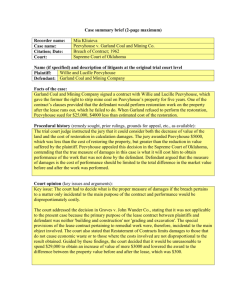

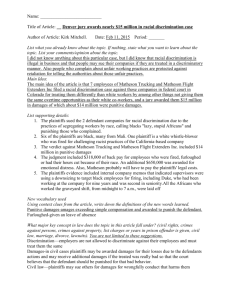
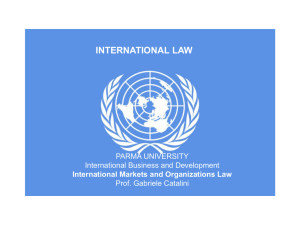



![[Click and Enter Attorney Name], State Bar No - E](http://s3.studylib.net/store/data/007177564_1-4d9407aff5e1ecb2a5922cd955484ee2-300x300.png)
